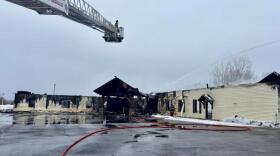A program that helps consumers make healthier food choices is in jeopardy after its federal funding was pulled by the Trump administration.
Carol Watkins is the SNAP-Ed program manager for the central region, serving Oneida, Oswego, Hamilton, and Herkimer counties.
She said although the program was created to provide nutrition education to people who receive SNAP (Supplemental Nutrition Assistance Program) benefits, it reaches far beyond that, from appearances at local farmers’ markets to schools.

“We're doing food demonstrations, providing children with food tasting of mostly produce items, easy recipes that we can send home with them that could be easy for their families to do with them," said Watkins.
Watkins said in Oswego County alone, SNAP-Ed reached about 1,000 people last year. And over the program’s history, SNAP-Ed’s nutrition education has been delivered to more than 200,000 New Yorkers in all 62 counties.
Shayna Russo, the program’s statewide technical assistance coordinator, said educators help with everything from how to stretch a budget to encouraging people to taste foods that they have been hesitant to try.
"There's limited access sometimes to the foods, and there's limited chances to try,” Russo said. “When you know what you like, you're going to spend the money on just that item because you don't have a second chance. You don't have another budget to work with."
But the federal government is pulling funding for SNAP-Ed, and the program will no longer receive money as of Sept. 30.
Russo said more than 200 people work at SNAP-Ed statewide, and right now, they’re focusing on winding down operations. She encourages people to reach out to elected officials if they value the program.
"Food is a necessity,” said Russo. “It's something that everybody needs. The cost of food is going up. Jobs can be difficult to find, so you never know when you're going to be in a situation where money may be tight."
Watkins said SNAP-Ed is working with community partners to see if there’s any way to save portions of the program’s work.
"Those opportunities are going to be less, and people are going to be seeing less of it,” Watkins said. “So, you might not have known what it was, but I do think they're going to notice when it's not there.”








